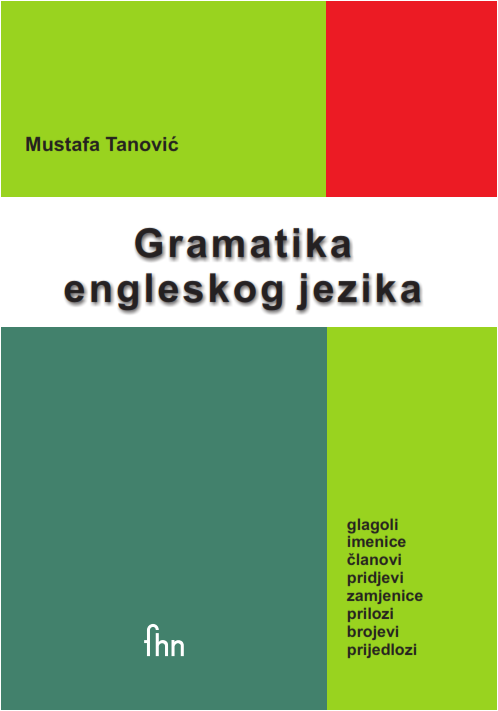
A Grammar of the English Language
Gramatika engleskog jezika
Keywords: English language; English grammar;
More...
Keywords: English language; English grammar;
More...
The report uses a crime victimization survey as an alternative analytical tool to make an independent assessment of the crime situation in Bulgaria for the period 2001–2004. The crime victimization survey polls people’s experiences with crime. Unlike official government crime statistics, the regular crime victimization surveys help the police and government authorities, as well as the public to understand: • whether the official police crime data reflect the real crime rate and crime trends; • the volume of the unreported crime; • the reasons victims do not report crimes to the police; • whether the police avoids registering reported crimes; • the profile of the social groups that are most at risk of falling victims to crime.
More...
This book is a follow-up to our project devoted to personal narratives of ex-Soviets in Israel. Our original plan was to collect previously published articles dealing with immigration issues but differing from the main themes of our book Ex-Soviets in Israel: From Personal Narratives to a Group Portrait (Fialkova & Yelenevskaya 2007). The themes of immigrants in the city, attitude to law, immigrants’ literature and humor were touched upon but not developed in depth in that volume.They were researched in a number of papers written later (Fialkova &Yelenevskaya 2006, 2006a, 2011, 2012, Yelenevskaya & Fialkova 2006,2008) and discussed in our presentations at 11 scholarly conferences.However, when we re-read the articles we realized that the situation in the Russian-speaking community was so dynamic that studies conducted three-five years ago should be seriously revised and updated.
More...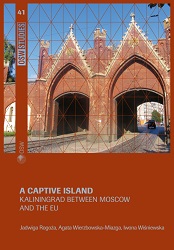
Keywords: Kaliningrad District;Russian political system; EU borderland;Russian Federation (RF);
The Kaliningrad region can be called a 'captive island', because of its specific geopolitical location - it is part of the Russian legal, political and economic space, yet it is geographically separated from the rest of the Russian Federation, and it is particularly open to co-operation with its neighbours in the European Union. Moscow is trying to compensate the region for its separation, offering it financial support and economic privileges.At the same time, it is sensitive to any potential challenges to Russia's territorial integrity - and the centre's desire for control over the region often limits the latter's potential for cooperation and internal development. This report presents the situation in the region, and is intended to help develop a model for its effective regional co-operation with its EU neighbours.
More...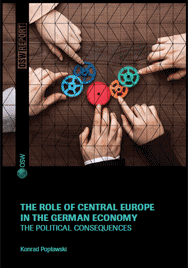
Keywords: Germany;Central Europe;economic relations; Visegrád Group;modernisation;
Recent publications allow us to conclude that the economic relations between Germany and Central Europe have come to the ‘end of history’, and nothing new will happen. However, a deeper analysis of these relationships reveals interesting new trends. Since joining the European Union the states of Central Europe have not settled for maintaining the average level of economic development, but have continued to narrow the distance between them and Western Europe, something which the global financial crisis did not prevent. Their improved economic situation also affected their relations with Germany. The latest results from the Visegrád Group states show them to be Germany’s most important trading partner, and their balance of trade in goods is in a state of equilibrium, while many euro area countries have recorded high trade deficits with Germany. The aim of this report is to display the trends in trade and investment between Germany and Central Europe, based on the example of the Visegrád Group. The author will also attempt to answer the question of whether the advancing economic cooperation between Germany and the V4 countries will lead to the further modernisation of those countries’ economies, or whether it will run the risk of leaving them in the ‘middle income trap’.
More...
Keywords: Estonia;Ethnic relations;Jewish History;Holocaust
Estonia is perhaps the only country in Europe that lacks a comprehensive history of its Jewish minority. Spanning over 150 years of Estonian Jewish history, On the Margins fills this lacuna. Rebuilding a life beyond so-called Pale of Jewish Settlement, the Jewish cultural autonomy in interwar Estonia, and the trauma of Soviet occupation of 1940–41 are but few issues addressed in the book. Most profoundly, the book wrestles with the subject of the Holocaust and its legacy in Estonia. Specifically, it examines the quasi-legal system of murder instituted in Nazi-occupied Estonia, confiscation of Jewish property, and Jewish forced labor camps. One the Margins develops an analysis of the causes of collaboration in the Holocaust and explains the dynamics of war crimes trials in the Soviet Union since the 1960s and so-called denaturalization trials in the United States in the 1980s. The haunting memory of Soviet and Nazi rule, the book concludes, prevents a larger segment of the Estonian population today from facing up to the Holocaust and the universal message that it carries
More...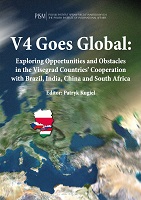
Keywords: V4;Visegrad 4; Visegrad Group; Brazil; India; China; South Africa
Over the last few years, the Czech Republic, Hungary, Poland and Slovakia—comprising the Visegrad Group (V4)—have been developing the global dimension of their foreign policy and exploring economic opportunities in non-European markets. The financial and economic crisis in the EU, coupled with the strong growth in emerging economies, made diversification of exports a more attractive option than before. After two decades of internal transformation and a focus on Euro-Atlantic integration, the Visegrad countries also became more capable and more interested in looking for new partners beyond Europe and rebuilding old relationships that received less attention after 1989.
More...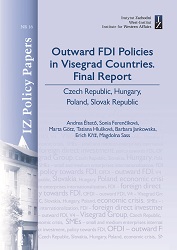
Keywords: Visegrad Countries; V4
Visegrad Four (V4) due to the specific dependence on foreign capital have been labelled as “dependent market economies” with a comparative advantage in the assembly of goods such as cars or consumer electronics [Noelke, Vliegenthart 2009]. This project focuses on the opposite side of international capital movements as it explores the phenomenon of outward investment made by V4 indigenous firms.
More...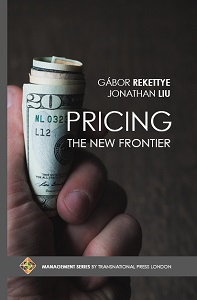
Keywords: Pricing; finance; business; management;marketing;
PRICING The New Frontier by Gábor REKETTYE and Jonathan LIU underlines the importance of pricing and price management is growing all over the world, primarily due to the turbulent economic situation, accelerating technological development, the saturation of markets and the globalization of competition. All these trends affect the achievement of company objectives, place prices, pricing and price management in a context that differs greatly from what has been known before. At a time when almost continuous change is disrupting nearly all industries and the internet is putting ever more power in the hands of the customer, a book that treats pricing with substance and foresight is a welcome addition to the market. – John R. Schermerhorn, Jr., O'Bleness Professor Emeritus, Ohio University, United States
More...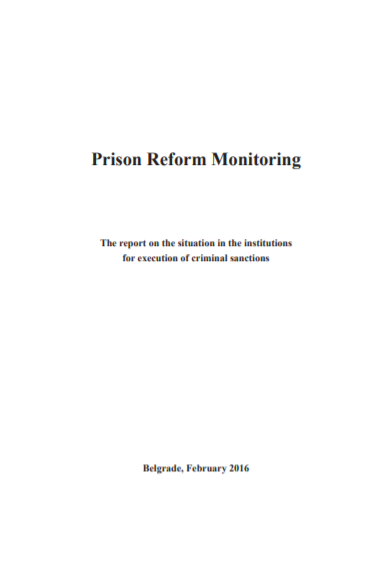
Keywords: prison reform monitoring; Niš; Sremska Mitrovica; Zabela; Požarevac; Valjevo; prison hospital; living conditions; health care; treatment; Kragujevac; Belgrade; Subotica; Sombor; Zrenjanin; Novi Sad; Smederevo; Pančevo;
The Helsinki Committee for Human Rights in Serbia (HCS) continued monitoring the prison system reforms in 2015, i.e. the reform of the institutions for the enforcement of criminal sanctions in Serbia. The project entitled "Continued monitoring of the prison system reforms" was supported by the Civil Rights Defenders. Visits to the institutions for the enforcement of criminal sanctions and offices for alternative sanctions were accomplished with the permission and support of the Ministry of Justice and the Directorate for Enforcement of Criminal Sanctions, while the visits to the detainment units were accomplished with the license and support of the presidents of higher courts with jurisdictions over the territory in which they are located. The expert team performing the monitoring of the institutions for the enforcement of criminal sanctions comprised the lawyers from the Helsinki Committee, Ljiljana Palibrk and Jelena Mirkov, full-time professor at the Faculty of Special Education and Rehabilitation Dr Zoran Ilić and a specialist of general practice medicine, Dr Aleksandra Bezarević. During the project that took part in the second half of the 2014, the Helsinki Committee team visited six institutions in the competence of the Directorate for Enforcement of Criminal Sanctions at the Ministry of Justice: five penitentiaries (in Niš, Sremska Mitrovica, Zabela, Požarevac and Valjevo) and Special Prison Hospital in Belgrade. In addition, Offices for Alternative Sanctions in these cities were also visited. The continuation of the project in 2015 encompassed visits to seven district prisons in Subotica, Kragujevac, Belgrade, Zrenjanin, Novi Sad, Smederevo and Pančevo and two visits to penitentiaries in Sombor and Padinska Skela. In 2015, the Helsinki Committee team also visited six offices for alternative sanctions in Subotica, Sombor, Kragujevac, Novi Sad, Smederevo and Pančevo.
More...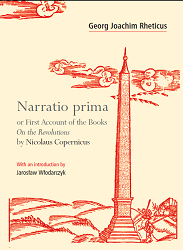
Keywords: history of astronomy; Copernicus; heliocentric system; Sun; permanent stars; Rheticus
The first Polish critical edition of Georg Joachim Rheticus’ Narratio Prima (First Account), the treatise on heliocentric astronomy, written in Frauenburg (Frombork), where Rheticus spent two years with Copernicus, and published in Danzig (Gdańsk), in 1540. Georg Joachim Rheticus is known in the history of science as the only disciple of Copernicus and the man, who played a vital part in publishing Copernicus’ revolutionary work De revolutionibus, which was to become the foundation for modern science. In 1540 the world first heard about the heliocentric theory of Nicolaus Copernicus. Paradoxically enough, this revolution in astronomy was announced not by Copernicus himself but by Georg Joachim Rheticus, a young Lutheran mathematician of Wittenberg, who published the First Account of the Books “On the Revolutions” by Nicolaus Copernicus. His book preceded the publication of Copernicus’ De revolutionibus by three years and became one of the most fascinating texts documenting the life and work of the great Polish astronomer. Rheticus wrote the Narratio prima in Lubawa where he stayed with Copernicus.
More...
Keywords: Ukraine; foreign trade; international relations; economic policy; cooperation with Russia; economic relations with European Union;
The multi-vector policy, i.e. manoeuvring between the West and Russia without becoming involved in integration projects with either of them, which Ukraine had been following since it regained independence also had an economic aspect. Trade with Russia and other post-Soviet countries, the European Union and the rest of the world was equally important for Kyiv albeit for different reasons. Ukraine’s unwillingness to make binding decisions whether to establish closer co-operation with Russia or the EU was to a great extent an effect of its concern about the negative impact of this move on economic relations with the remaining areas. Ukrainian oligarchs, the main beneficiaries of income from exports, also failed to take a joint stance of integration processes in the region and were satisfied with the state of suspension in which Ukraine had found itself.
More...
Keywords: Edward Perry Warren; biography; notes; translations; English literature; novel; poetry; philosophy;
These volumes provide scholarly editions of Edward Perry Warren’s works (all, save one, never before re-issued), augmented by a biographical introduction, extensive notes, translations, illustrations, and appendices. For the first time, Warren’s voice is heard in full—through his correspondence and other residues that constitute his commissioned Edward Perry Warren: The Biography of a Connoisseur, through his conversation, captured in Osbert Burdett’s An Imaginary Conversation, through his novel A Tale of Pausanian Love (published here for the first time) and his collection The Wild Rose: A Volume of Poems, through his fairy-tale The Prince Who Did Not Exist and his scholarly article The Scandal of the Museo di Villa Giulia, through his pamphlet Classical & American Education and his retelling of three Greek legends in Alcmaeon, Hypermestra, Caeneus, and through his magnum opus, the apologia A Defence of Uranian Love.
More...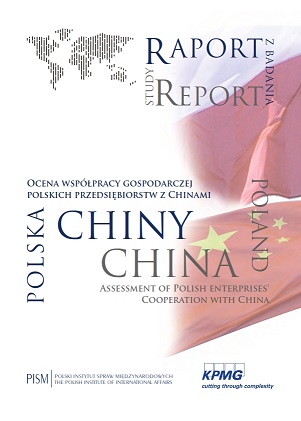
Keywords: Poland; People’s Republic of China; Polish-Chinese economic cooperation; Polish enterprises’ cooperation with China; expanding trade and investments;
Poland is increasingly developing economic cooperation with non-European countries. The development of such cooperation is much more difficult than in the case of European countries, mainly because of the geographical distance, the different business environment and high competition with foreign companies. However, due to the EU’s protracted economic problems, one solution for Polish companies has been to search for new business partners outside Europe and expand trade and investment on new markets where the Polish presence is relatively weak. One of the most important directions of this expansion is the East, with China being among the largest centres of the global economy and a country with the highest rate of economic growth. Not only China’s economic success but also its size and the growth potential of its internal market offer great opportunities for foreign companies and their business interests. China is one of the most important directions for expansion in the business strategy of many companies in the next few years.
More...![Pricing - The New Frontier [Colour interior]](/api/image/getbookcoverimage?id=document_cover-page-image_846377.jpg)
Keywords: economy; price; cost; profit; pricing: price management; economic crisis; 21st century; market forms; demand curve; monopoly; customer price perception; price setting methods; international markets; product life cycle pricing;
Pricing: The New Frontier by Gábor REKETTYE and Jonathan LIU Published: May 2018 The importance of pricing and price management is growing all over the world, primarily due to the turbulent economic situation, accelerating technological development, the saturation of markets and the globalization of competition. All these trends affect the achievement of company objectives, place prices, pricing and price management in a context that differs greatly from what has been known before. In developing and fast moving economies like India, getting the pricing strategy right is a necessity for the short and long term future of the firm. The pricing decision will impact on the profitability and ultimately on the performance of the firm. Executives and managers responsible making pricing decisions will find this book useful and informative in shedding light on an area that is complicate and complex. – Dr M.K. Nandakumar, Associate Professor of Strategic Management, Indian Institute of Management, Kozhikode, India. Leading technological development across the world requires an in-depth understanding of the impact of the pricing decision and business strategy. This book will give its readers a clear understanding of impact of the pricing decision on the industry, the customer and its competitors. I fully recommend and endorse this book. – Jeff C.K. Lim, BU Deputy CEO at ASM Pacific Technology Ltd. Singapore. Pricing of goods and services is a critical decision that creates immediate competitive advantage. This book explains the principles of pricing clearly and concisely. It seamlessly knits concept and practice. It is a useful text book but also useful to practicing managers charged with challenging task of pricing goods and services. I strongly recommend the book to practitioners and students. – Professor Abby Ghobadian FBAM, FAcSS, CCMI, Professor of Management, Henley Business School, United Kingdom. At a time when almost continuous change is disrupting nearly all industries and the internet is putting ever more power in the hands of the customer, a book that treats pricing with substance and foresight is a welcome addition to the market. – Professor John R. Schermerhorn, Jr., O’Bleness Professor Emeritus, Ohio University, United States In contemporary business pricing is much more than just the money equivalent of the product value. This book provides a high-quality review of different concepts and issues regarding pricing from different stakeholders’ perspectives. It can be recommended both as students’ textbook as well as a managers’ toolkit for making strategic and tactical pricing decisions. – Professor Mirna Leko Šimić, Professor of Marketing at Faculty of Economics at J.J. Strossmayer University of Osijek, Croatia Price is the value that is attached to a product or service and is usually the result of complex set of calculations, research and risk analysis. This book provides comprehensive and understandable strategies and tactics that one may use to price a product or service in our current the multi-faceted operating environment. It is a great resource for both practitioners and academics. – Dr Dolores Rinke, CPA, Professor Emerita, Purdue University, United States In a fast-changing world with fierce competition, pricing has been increasingly the new frontier and battle field for business operations. Dynamic pricing needs to be deployed as the brand new strategy for global organizations to gain competitive advantages and sustainable profit growth. This book provides insightful knowledge of the dynamics of setting price in a networked global context, and enables academics and professionals to have a clear understanding of the principle and practice. – Dr Xinping Shi, Associate Professor of Information and Operations Management, Hong Kong Baptist University, Hong Kong SAR China. Getting the pricing of products and services right is challenging and difficult. It is more complicated in a globalized world and further challenging when it is across different types of economies. This book will offer guidance in setting and negotiating prices for trading across borders and on the digital platform, and will prove useful for practitioners and students. I highly recommend the book. – Professor Vincent XG Qi, PhD, FRAI, Wolfson College, University of Cambridge; Marcel Mauss Chair Distinguished Professor of Global Supply Chain Management and Business Anthropology, Anshan Normal University in China. Contents PART 1. PRICING BASICS Chapter 1. PRICING IN FOCUS Chapter 2. THE ECONOMICS OF PRICING Chapter 3. CUSTOMERS’ PRICE PERCEPTION Chapter 4. PRICES, COSTS AND PROFIT Chapter 5. METHODS OF PRICE SETTING PART 2. STRATEGIES AND TACTICS OF PRICING Chapter 6. PRICING STRATEGY Chapter 7. PRODUCT LIFE CYCLE PRICING Chapter 8. DYNAMIC PRICING Chapter 9. PRODUCT LINES PRICING Chapter 10. PRICE BUNDLING PART 3. INTERMEDIARY PRICING Chapter 11. PRICING ACROSS THE MARKETING CHANNELS Chapter 12. RETAIL AND WHOLESALE PRICING Chapter 13. PRICING IN INTERNATIONAL MARKETS Chapter 14. SUCCESSFUL PRICE NEGOTIATIONS Bibliography Index Product Details: ISBN: 9781910781944 Publisher: Transnational Press London Published: 23 May 2018 Language: English Pages: 320 Interior Ink: Black & white Weight (approx.): 0.65 kg Dimensions (approx.): 18.9cm wide x 24.59cm tall
More...
Keywords: holocaust;trauma;food;cuisine culture;oral history;Jewish history;
Having realized that, with the exception of cholent and flódni (a Jewish multilayered poppy-seed pastry), she knew nothing about Transylvanian Jewish cuisine, Kinga Júlia Király set out on a three-year project to fulfill her own cravings for authentic flavors—but, more profoundly, to learn about prewar recipes and customs and to find out what remained of kosher households in Northern Transylvania. She conducted some three hundred hours of participant-observer interviews, sometimes spiced with cooking sessions, with ten survivors who had experienced the Holocaust as teenagers or children. At the heart of Kinga Júlia Király’s work are the simplest things, the minutiae of everyday life. Tiny details, which, in the recording, are transformed into something of huge significance. She created handholds of remembrance for the last surviving members of a minority.
More...
Keywords: biography; Gökhan Kutluer; Italy; leaving comfort; migration; professional; Transnational lives; Turkey;
“Any settlers in the family?” “You don’t look Turkish at all, are you an émigré?” “Where are you originally from?” From an early age, I started hearing these questions. Either in school, during a cab ride, in the office or in my new social circles. I face these questions right after we start chatting… and this happens often. I always expect it. “Gökhan, where are you from?” I evolved: my height, my features, my voice, my gestures, the way I think, and many more but the answer to this question has never changed: “My ancestors used to live in Greece. They were there for a few generations. With the convention concerning population exchange between Turkey and Greece, my ancestors moved here permanently.” What I kept hearing on the grapevine eventually became a solid truth. I came to grasp the fact that my ancestors lived in Drama, Ptolemaida and Eleftheroupoli in Greece. All this longing to flee from my homeland and desire to get to know other places would clearly relate to a genetic interpretation. However, I still couldn’t say it all fit.
More...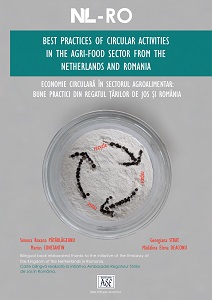
Keywords: circular economy;agri-food sector;decarbonized economy;sustainable production;sustainable consumption;climate change adaptation;food waste management;
Agriculture and food production have always been a connecting link between countries worldwide. The Netherlands and Romania have a longstanding and strong relationship working together in the field of agriculture and food. Both countries support the development of a worldwide transition to a sustainable and honest food production system. Moreover, the Netherlands and Romania respect the sustainable use of natural resources, safeguarding nature and biodiversity, and ensuring food security — as recorded in the 2030 Agenda for Sustainable Development. The upcoming Common Agricultural Policy requires a transition by innovation to a new and sustainable agri-food production system, which is both sustainable and more efficient while protecting the traditions of rural areas at the same time. The Netherlands and Romania aim to work strongly together as partners to make this happen. The scope of book is to present best practices from the Netherlands and Romania regarding circular economy projects and activities from the agri-food industry. These projects refer to actions focused on: closing the circle from waste to resources; climate change and ecosystem conservation; increasing the appeal and vitality of rural areas; projects that enhance the regional economy.
More...
Keywords: DMO’s; tourism destination; Bulgaria; specialized tourism types
The relevance of the topic for tourism destination management is determined by the need to overcome the seasonality in tourism in Bulgaria, as part of its sustainable development, and becomes a basis for research by many experts in science and practice. This is evidenced by the fact that the policy of the Ministry of Tourism for recent years is oriented in this direction – to develop four-season products and destinations advertising Bulgaria. It is still not possible to say that the country’s potential has been used in the most rational way possible. The present study examines the pre¬requisites and opportunities for development of the newly established tourism regions in Bulgaria, as well as some specialized types of tourism and the positioning of the country on the international market as a com¬petitive destination. Also, the study aims to develop recommendations for improving the marketing management of the newly established organiza-tions for management of tourism regions in Bulgaria, known in the world literature as DMO (Destination Management Organization).
More...
Keywords: lexis; scientific terminology; lexical hierarchy; natural sciences; social sciences;
The focus of the monograph is on hierarchical systems of lexical items, particularly in scientific terminologies. It includes research outcomes from the dissertation Lexical Hierarchies in the Scientific Terminology, supplemented with a broad introduction to the typology of lexical and semantic relations and to a variety of branching and non-branching hierarchies, proportional series and other types of lexical configurations. It analyses the principles of formation of terminological classificatory hierarchies and identifies sense relations between items at superordinate and subordinate levels, and those at the same level. Specific morphological and onomatological properties of different languages influence consistency of corresponding lexical hierarchies, although the conceptual systems are identical.
More...